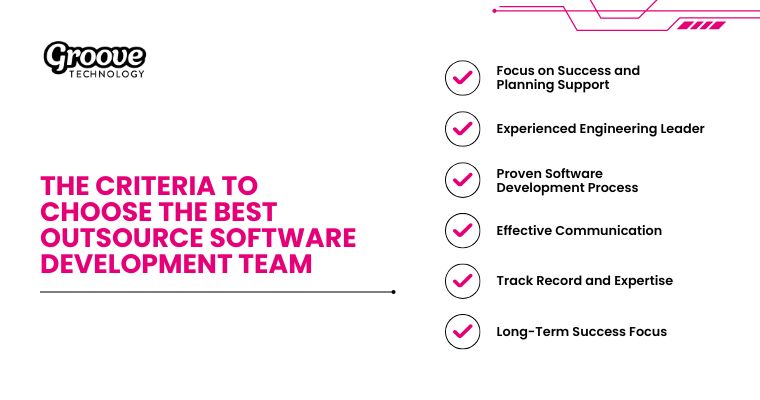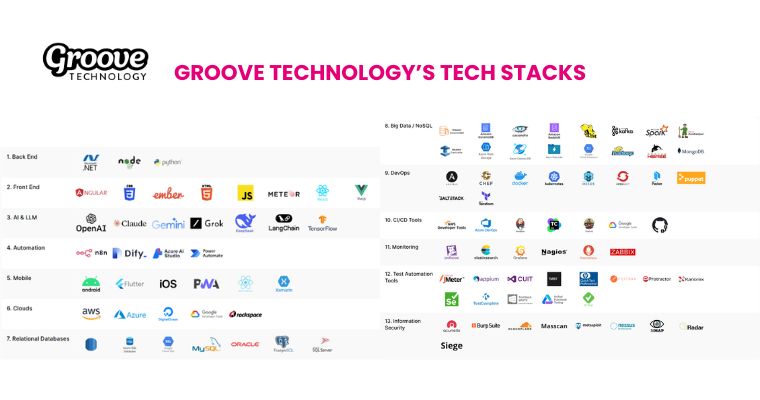How To Hire an Outsource Software Development Team Effectively in 2025?
Hiring outsource software development team means contracting a third-party company or group of specialists to handle software development tasks for your business. This approach allows businesses to tap into global talent, leverage advanced technologies, and scale efficiently—without the overhead of maintaining an in-house team.
To fully realize these benefits, it’s essential to hire software developers outsourcing that are reliable. This guide will walk you through the key advantages of hiring outsourcing software developer team, criteria for selecting the right team, and how to evaluate potential partners to ensure a smooth and effective development process.

1. What is an Outsourcing Software Development Team?
An outsourced software development team is a group of external specialists dedicated to handling a company’s software projects. Instead of hiring and training an in-house team, businesses partner with a trusted provider to access a global pool of experienced developers and engineers. This approach allows companies to save costs, reduce overhead, and tap into diverse technical expertise while focusing on their core business activities.
Whether it’s custom software development, mobile app development, web development, e-commerce development, IT consulting, or ongoing maintenance and support, the team works collaboratively to deliver tailored, high-quality solutions that drive business growth and long-term success.
A typical outsourced software development team includes:
- Project Manager: Oversees the project, managing timelines, budgets, and acting as the main communication link.
- Software Developers: Core programmers responsible for coding the software.
- Quality Assurance Specialists: Test the software to ensure functionality, usability, and quality.
- UI/UX Designers: Design intuitive and user-friendly interfaces.
- Business Analysts: Identify client needs and align solutions with developer output.
- DevOps Engineers: Manage environments and streamline the development process.
So, what types of software developers can businesses actually outsource their projects to in order to gain the right mix of skills, creativity, and technical expertise for successful product delivery? To give you a clearer picture, here are the main roles you can hire depending on your technical goals and project requirements.
- Frontend developers: Specialists in interface design who build engaging layouts, refine visuals, and improve interactivity to make your website or application intuitive and easy to use.
- Backend developers: Experts in databases, server-side logic, and API management who keep the application stable, secure, and responsive, making sure everything works smoothly behind the interface.
- Full-stack developers: Multi-skilled engineers capable of handling both the front and back end. Their flexibility makes them suitable for projects that require a connected workflow between user experience and system functionality.
- Mobile app developers: Professionals who design and develop applications for iOS and Android platforms. They help brands expand their presence and deliver seamless performance across different devices.
- DevOps engineers: Coordinators between software development and IT operations who automate processes, manage updates, and maintain a consistent delivery cycle to keep projects efficient and reliable.
>> See more: A Completed Guide To Software Development Outsourcing 2025

2. Why Should You Consider Hiring an Outsourcing Software Developer Team?
Hiring an outsourced software development team is the best solution for businesses looking to optimize their software projects. But why outsource software development in the first place? There are five key reasons why outsourcing is a game-changer for your business:
- Cost-Effectiveness and Scalability: Outsourcing helps reduce costs for salaries, infrastructure, and training, leading to operational savings. It also provides a competitive edge by offering the flexibility to scale the team size based on project demands. By outsourcing, businesses can eliminate recruitment hassles and reduce overhead.
- Access to a Global Talent Pool: Outsourcing opens the door to skilled developers and IT professionals with diverse expertise. It enables businesses to access specialized skills that may be difficult to find locally. Through AI-powered recruitment and cloud-based tools, the team can seamlessly work across time zones, fostering innovation.
- Focus on Core Business Functions: With outsourced teams handling development, internal resources can concentrate on core business activities, such as strategy and innovation. This leads to operational efficiency, cost savings, and strengthens the company’s unique value proposition.
- Faster Time-to-Market: Outsourcing accelerates time to market by leveraging specialized teams that use Agile methodologies for iterative progress. This speeds up product launches, allowing businesses to stay ahead of competitors while internal teams focus on strategy and customer relationships.
- Flexibility in Resource Allocation: Outsourcing allows businesses to quickly adjust team sizes based on changing project needs, ensuring optimal resource use. Companies can access specialized skills without long-term commitments, supporting dynamic project execution and quick responses to market changes.

3. How to Succeed in Hiring an Outsourcing Software Developer Team Effectively?
Hiring an outsourced software development team is about choosing the right partner who understands your product vision and can grow with you. In this section, we’ll explore strategic approaches to succeed in hiring an outsourcing software developer team effectively — minimizing risks, saving time, and maximizing results.
Step 1: Set Clear Project Objectives
Project success starts with well-defined, measurable, and shared objectives. Clarifying project scope, expected outcomes, technical specifications (including programming languages, platforms, and key features) lays the groundwork for development. These elements also serve as benchmarks to track progress and evaluate performance throughout the project lifecycle.

Step 2: Research and Evaluate Potential Providers
The quality of your outsourced team hinges on selecting the right partner. That’s why when you hire software developers outsourcing, you should review each provider’s portfolio, past projects, client feedback, and industry-specific experience. Prioritize vendors with proven expertise in the relevant tech stack and a demonstrated ability to meet timelines and expectations in similar projects.

Choose the right outsourcing partner by evaluating their portfolio, experience, client feedback, and ability to meet project requirements
Step 3: Select the Appropriate Engagement Model
Selecting a suitable engagement model is critical and should reflect the project’s nature, budget, and flexibility requirements. For projects with well-defined scopes and clear deliverables, a fixed-price model offers cost certainty. In contrast, time-and-materials models are ideal for projects with evolving requirements, offering greater adaptability.
If you require ongoing support or large-scale development, consider a dedicated team model to gain access to scalable resources and foster long-term collaboration.

Step 4: Verify Technical Expertise
Verifying the technical proficiency of your potential partner is essential. This process should include structured interviews, thorough portfolio reviews, and practical coding tests. Ensure the team is proficient in key development tools, modern frameworks, and relevant methodologies.
Their ability to solve complex technical problems is a strong indicator of their competence and readiness to meet your project’s demands. A technically sound team will deliver higher-quality outcomes with fewer delays and issues.
Verify the technical expertise of potential partners through interviews, portfolio reviews, and coding test

Step 5: Establish Effective Communication Channels
Effective communication is the backbone of a successful outsourcing relationship. Set up clear communication protocols early on, including update frequency, reporting formats, and feedback channels. You can use collaboration tools such as Slack, Trello, or Jira to centralize communication and enhance visibility.
Additionally, both should agree on response times, issue escalation procedures, and regular status updates to ensure all stakeholders stay informed and aligned throughout the project lifecycle.

Step 6: Manage Time Zone Differences
When working with international teams, time zone differences can pose challenges, but they can also be managed strategically. Plan meetings and reporting schedules that allow for overlapping working hours to maintain consistent communication.
Partnering with nearshore vendors such as Vietnamese development teams for Australian clients can offer optimal time zone alignment, facilitating faster feedback loops and real-time collaboration.
Managing time zone differences with international teams can be optimized by scheduling meetings during overlapping hours

Step 7: Draft a Detailed Contract Agreement
A well-drafted contract protects both parties and sets clear expectations for the outsourcing engagement. The agreement should specify deliverables, timelines, payment terms, intellectual property rights, and confidentiality clauses.
It should also outline dispute resolution mechanisms, performance metrics, and termination conditions. A thorough legal agreement lays the groundwork for a secure and productive long-term partnership.

Step 8: Test with a Pilot Project
Before committing to a full-scale collaboration, consider initiating a smaller pilot project. This allows you to evaluate the vendor’s technical skills, communication style, and ability to meet deadlines, all with minimal risk.
A pilot also helps determine how well the team integrates with your organization’s workflows and culture. Use this trial phase to verify alignment with your quality standards before moving forward with a larger investment.

4. What Are The Criteria to Choose The Best Outsource Software Development Team?
To ensure a successful collaboration, you need clear criteria to assess their skills, workflow, and adaptability. This section provides a practical checklist to help you choose the best outsourced software development team — right people, right expertise, right expectations.
- Focus on Success and Planning Support: Hiring outsourcing software developer team can help compensate for internal resource shortages, particularly important for startups creating Minimum Viable Products (MVPs). Your outsourcing partner should assist with key planning tasks, including wireframing, cost estimation, UX/UI design, and development. They must help ensure the project is feasible within budget and timelines.
- Experienced Engineering Leader: A strong, high-performing leader is essential for guiding the team and ensuring project success. The leader acts as the primary point of contact for updates and questions, aligning the team and providing confidence in the project’s direction. Their technical expertise is crucial to the product’s development.
- Proven Software Development Process: The team should follow a structured development methodology, such as Agile or Scrum. Adaptive planning, early delivery, and continuous updates help keep the project on track. A proven process enhances efficiency and effectively tackles challenges.
- Effective Communication: Clear communication is vital to prevent misunderstandings. Using project management tools like Slack, Trello, or Jira ensures smooth coordination. Multiple communication channels should be established to provide regular updates and gather feedback, especially when using Agile methods that require constant collaboration.
- Track Record and Expertise: Your outsourcing partner should have a strong track record in your industry and with your technology stack. Let’s review portfolios, case studies, and client testimonials to assess their experience and reliability when you’re hiring outsourcing software developer team.
- Long-Term Success Focus: The best outsourcing partners focus on your long-term success, not just completing the project. They should demonstrate an ongoing commitment to the success of your project and contribute to achieving your broader business goals.

5. How to Evaluate an Outsourcing Software Development Team Before Hiring?
Evaluating an outsourced software development team goes beyond technical screening. It’s about understanding their mindset, collaboration style, and ability to align with your business goals. If you’re wondering how to choose a software outsourcing company, follow these five essential steps to make the right choice:
- Step 1 – Assess Portfolio and Experience: Start by reviewing their portfolio including past projects, industry expertise, and client testimonials. Teams with experience in similar products will more quickly grasp your goals and speed up delivery.
- Step 2 – Conduct In-Depth Vendor Interviews: Through interviews, you can observe how well the team communicates, solves problems, and takes initiative. These qualities help distinguish between a task-taker and a true collaborator.
- Step 3 – Communicate Your Product Vision: Share your product goals, target audience, and core values openly. This is a crucial moment to see if they understand your intent and ask meaningful questions — not just code, but deliver the right solution.
- Step 4 – Choose a Partner, Not Just a Vendor: Your ideal development team should be a long-term partner, not a one-time contractor. Their openness to collaboration, adaptability, and growth mindset are essential for building a sustainable relationship.
- Step 5 – Evaluate Their Understanding of Your Needs: Finally, you can ask the team to rephrase your goals or propose custom solutions. If they demonstrate a deep understanding of your needs, it’s a strong signal that they are ready for meaningful collaboration.

6. Why Groove Technology Is a Good Choice for Hiring an Outsourcing Software Development Team ?
Choosing the right software development partner can make all the difference to your project’s success. When you work with Groove Technology, you’re not just hiring outsourcing software developer team support, you gain access to a skilled team, agile processes, and a strong commitment to quality — making it an ideal choice for businesses looking to build an efficient and reliable software development team.
- Easy On-boarding: Our onboarding process easily fits into your workflow, whether you use Agile, Scrum, Kanban, or another framework. Groove Technology developers communicate proactively, clarify expectations early, and adapt quickly so your new team becomes a natural part of your organization from the very first day.
- Transparent Cost Management: We provide complete financial clarity through upfront pricing, detailed cost structures, and performance-based incentives. You always know how your investment is used, with the flexibility to scale your team or adjust project scope as your business grows.
- Quality Assurance: Every Groove developer is carefully selected and certified to meet industry standards. We value both technical expertise and a positive working attitude. Continuous training and long-term development programs help us maintain high-quality performance across every project.

7. Tech Stacks for Outsource Software Development at Groove Technology
At Groove Technology, we utilize a diverse range of tech stacks to develop high-quality, scalable software solutions. Here are 10 key tech stacks we use:
- Back End: .NET, Python, Node.js
- Front End: HTML5, CSS3, JavaScript (JS), Angular, React.js, Meteor, Vue.js, Ember.js
- AI & LLM: OpenAI, Claude, Gemini, Grok, Deepseek, LangChain, TensorFlow
- Automation: n8n, Dify, Azure AI Studio, Power Automate
- Mobile: Android, Flutter, iOS, PWA (Progressive Web App), React Native, Xamarin
- Clouds: AWS, Azure, Digital Ocean, Google Developer Tools, Rackspace
- Relational Databases: Amazon RDS, Azure SQL Database, Google Cloud SQL, MySQL, Oracle, PostgreSQL, SQL Server
- Big Data / NoSQL: Amazon DocumentDB, Amazon DynamoDB, Apache Cassandra, Amazon Redshift, Apache Hive, Apache Kafka, Apache Spark, Apache Zookeeper, AWS Elasticache, Azure Blob Storage, Azure Cosmos DB, Azure Data Lake, Google Cloud Datastore, Hadoop, HBase, MongoDB
- DevOps: Ansible, Chef, Docker, Kubernetes, Mesos, OpenShift, Packer, Puppet, SaltStack, Terraform
- CI/CD Tools: AWS Developer Tools, Azure DevOps, Jenkins, TeamCity, TravisCI, Google Developer Tools, GitHub
- Monitoring: Datadog, Elasticsearch, Grafana, Nagios, Prometheus, Zabbix
- Test Automation Tools: Apache JMeter, Appium, Coded UI Test, fMBT, HP QuickTest Professional, Postman, Protractor, Ranorex, Selenium, TestComplete, TestStack White, UFT One, XCTest
- Information Security: Acunetix, Burp Suite, CloudFlare, Masscan, Metasploit, Nessus, Nmap, Radar, Siege

8. FAQs
How much does it cost to outsource software development?
The cost of outsourcing software development varies greatly, with rates ranging from $15 to $100 or more per hour for a developer. Businesses often look for strategies to reduce software development costs while maintaining quality and efficiency. Costs depend on factors such as project complexity, development phase, team location, and software development type. Certain regions may offer more affordable rates than others.
How big should a dev team be?
The optimal size of a dev team depends on the project scope. For small to medium-sized projects, a team of 5 to 7 members is typically effective. This allows for agile development while ensuring the necessary skills for design, development, testing, and project management.
In this article, we explored the key steps and criteria to hire software developers outsourcing effectively in 2025. We discussed the importance of setting clear objectives, selecting the right engagement model, verifying technical expertise, and evaluating potential partners based on their experience and approach.
Groove Technology offers a transparent, client-focused approach that ensures smooth onboarding and collaboration. With expertise in Agile, DevOps, and a wide range of technologies, we’re fully equipped to help you hire an outsource software development team and support your project needs from start to finish.
What are other reputable platforms for researching and hiring outsourced developers?
Besides trusted companies like Groove Technology, you can explore platforms such as Upwork, Fiverr, DesignRush, and Toptal. These sites provide access to thousands of skilled developers and agencies, helping you quickly find talent that fits your project needs.
In this article, we explored the key steps and criteria to hire software developers outsourcing effectively in 2025. We discussed the importance of setting clear objectives, selecting the right engagement model, verifying technical expertise, and evaluating potential partners based on their experience and approach.
Groove Technology offers a transparent, client-focused approach that ensures smooth onboarding and collaboration. With expertise in Agile, DevOps, and a wide range of technologies, we’re fully equipped to help you hire an outsource software development team and support your project needs from start to finish.
Related Articles:
- Enterprise Software Development Staff Augmentation: A Brief Guide Of Success 2025
- Outsourcing software development service: Benefits, How To Hire And Cost
- How a Dedicated App Development Team Boosts Your Project?





